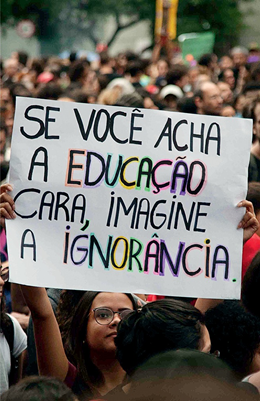by Gustavo Lins Ribeiro
Translated by Jayane Maia Reviewed by Matheus Lucas Hebling
Originally published in Portuguese March 23, 2020 link

The coronavirus pandemic certainly opens a new class of global fear. It is not like that anxieties, panics and global worries did not exist previously. However, as globalization is a historical process that has become increasingly sharp, it is expected that the last global fear will be more intense and complex than the others. What am I calling global fear? Here is a work definition: it is all tantalizing fear felt for all the inhabitants of a collective, with an expectation of an enormous amount of deaths, which potentially or in fact will reach everyone, and will bring an end to the world, known until a certain period of time. I leave the definition in a broad way to include some collective fears – obviously without any pretension of exhausting the examples – which, although are not planetary, will certainly include the feeling of the end of the world in a sort of archaeology of this terrible sensation, one real total social fact, as Marcel Mauss would say, that entails physiological, biological, psychological, cultural, political, economic, social and scientific responses.
I start with two quick and related examples. The first one was one of the most serious epidemics in human history that occurred just in the initial moments of the world system and decimated an entire world, which was called the New World. The first decades of colonialism in the Americas, especially in the so-called Mesoamerica due to its population density, were responsible for one of the worst demographic disasters in the history of humankind. Millions of people died as a result of diseases brought on (this thing of the virus being foreign, it is not new) by the ruthless conquerors. One cannot assign only the diseases for the debacle of the Aztec imperial world, but one cannot talk about it without considering them. We face a process that has been prolonged and persists, with less intensity, of course, even today, in different South American and Asian countries. The second example takes us to the deep Amazon. How many indigenous villages have been destroyed by the arrival of the flu? In the 1950s, Darcy Ribeiro reported the bacteriological war waged by farmers who threw from planes infected blankets in isolated villages. Here the “fall from the sky”, as the Yanomami would say in their dystopia, was terrible and we can imagine the agony and anguish of the people who suffered when they saw their world disappear mercilessly.
Global/planetary fears
After somewhat arbitrary historical and geographic jumps, I dedicate myself to global fears themselves. They assume the efficient functioning of space-time compression, the notion invented by David Harvey in 1989. We are talking about the shrinking of the world caused by the development of the communication and transport industries over the last 250 years (approximately). Possibly, the epidemic scholars may correct me, the first global fear was produced by the Spanish flu (this is the foreign virus, again), a pandemic in 1918, which infected 500 million people, about a quarter of the world’s population at the time, killing an estimated 50 million people or more. Due to the increase of the space-time compression (it suffices to remember the current effort to control airplanes and airports), the period of the 20th century onwards has been plentiful in global fears caused by epidemics. With the Spanish flu, AIDS and Ebola, to name a few, viruses are indicating our fragility as a species
But not all global fears are due to diseases that spread quickly and, at least in their first moments, in an uncontrollable way. I want to believe that the first atomic bombs dropped, in 1945, by the American Air Force in Hiroshima and Nagasaki caused a new type of global fear that ended up becoming the fear of the human capacity to destroy the planet through war. The fear generated by the nuclear arsenals during the Cold War after the Second World War triggered dystopian scenarios of nuclear winter with the consequent disappearance of humankind. Interestingly, we live in the present post-Cold War another dystopian scenario, with inverted temperatures, that of global warming and that of the Anthropocene, which also causes global fears about the fate of humanity. This time, what is at stake are the industrialist and consumerist capitalist society with its way of life that impacts sustainability on a planetary scale.
What global fears are for
They are for a lot. I won’t be able to explore them all here. I do not want to turn to a totally Foucaultian explanation appealing to a kind of global biopolitics. In any case, the hybrid war that the coronavirus is causing between the United States, the declining imperialist power, and China, the rising imperialist power, is noteworthy. Also, the different indigenizations made by right or left-wing governments are interesting. The cases of Brazil and the USA illustrate the former and Argentina, with the exemplary response of the new government, illustrates the latter. Nevertheless, it is clear the power that is transferred to States and their elites to intervene massively in all areas of life, including the right to live as it has been seen in Italy with the doctors’ choices about whom to save. It takes the opportunity to set up a military apparatus for control and surveillance over populations, curfews, circulation controls, and the right of assembly. Without the right to massive demonstrations, Chile, for example, suffered a major inflection of the political movement unleashed by its population against neoliberalism. In Brazil, one takes the opportunity to pass decrees that are even more harmful to the most vulnerable, while benefiting at the same time the large financial capital.
The coronavirus pandemic is the first where one lives online. The internet, with its multiplication of the capillary communication capacity, at the same time that fosters a global awareness, creates an expectation and paranoia related to the expectation that the large numbers of sick and dead, supposedly defined in a millimetre daily way, do not reach with the same intensity the places where we live. We are facing another enhancement of what I called, in 2003, the public-virtual-space. It is proven that isolation (the worst punishment, not counting death, that can be inflicted on a person) leads us to understand the need for social contacts – even if virtual – without which we cannot live. It is necessary to see statistics on the numbers of WhatsApp and Skype users in the different quarantine periods. It is revealed, once again, and strongly, the importance that public-virtual-space has acquired in our lives.
The coronavirus should serve to teach us lessons that are likely to be quickly forgotten by the political and economic elites, with some possible exceptions, after the current critical event. First lesson: the interdependence of human social life, most obviously demonstrable in cities, requires political conceptions that go far beyond individualism and neoliberal policies that destroy public services. It calls, in particular, for a strengthening of public health and education as strategic parts of the necessary safety net for everyone and not just for the least privileged. Second lesson: at a time when there are politically active groups, some with power, who worship anti-scientific and anti-intellectualist ignorance, the expectation of deadly devastation across the planet reaffirms the importance and authority of science as a way of grasp, assessment, and intervention, despite the persistence of some obscurantist nuclei that resist all evidence. The third lesson concerns the existence of a clear link between pandemics and environmental destruction. Viruses are migrating from non-human animals to humans. They are animals who have been hosts of pathogens for which we do not have adequate immunity. With human intrusion and the destruction of their original habitats, they end up coming into closer contact with people and even becoming human food. Unfortunately, given that the reversal of environmental destruction on a planetary scale seems to be far from becoming a reality, everything indicates that global fears caused by pandemics will continue to exist. The presence of irresponsible political and economic elites as to the luck of the planet also leads us to the same conclusion.
Gustavo Lins Ribeiro is a full professor in the Department of Cultural Studies at Universidad Autónoma Metropolitana – Unidade Lerma [JM1] (Mexico) and National Researcher Level III of the National Council of Science and Technology (CONACYT – Mexico). He was a professor in the Department of Anthropology at the University of Brasília for 26 years. He was president of the National Association for Research and Graduate Studies in Social Sciences (ANPOCS) and the Brazilian Association of Anthropology (ABA).
[1] I thank Claudia Zamorano Villareal from the Centro de Investigaciones y Estudios Superiores en Antropología Social (CIESAS-CDMX) for made me think about the topic.





